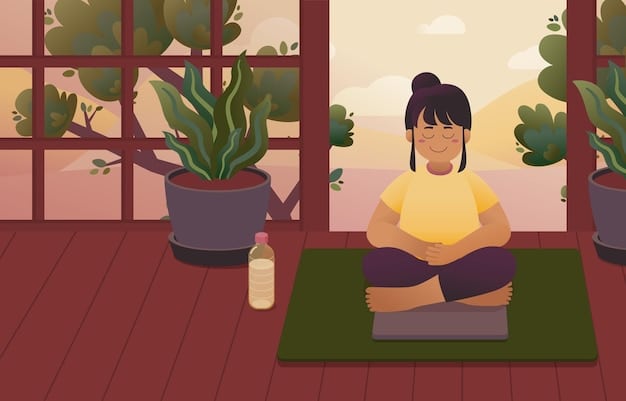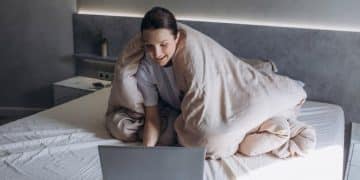Mom’s Mental Health: 5 Techniques to Reduce Anxiety by 25% in 6 Weeks

Mom’s mental health is crucial; this article explores five proven techniques, including mindfulness, exercise, social support, sleep hygiene, and professional help, to reduce anxiety by 25% in six weeks, enhancing overall well-being.
Being a mom is a rewarding but challenging job. The constant juggling of responsibilities can lead to stress and anxiety. Mom’s Mental Health Matters: 5 Proven Techniques to Reduce Anxiety by 25% in 6 Weeks, and this article will give you practical steps to start feeling better.
Understanding Mom’s Mental Health
A mother’s mental health is paramount to the well-being of the entire family. When moms are struggling with anxiety, it affects their ability to care for themselves and their loved ones. Recognizing the signs of anxiety is the first step toward finding relief.
Anxiety in moms can manifest in many ways, from constant worry and irritability to physical symptoms like headaches and fatigue. It’s essential to differentiate between normal stress and anxiety disorders, which require professional intervention.
Common Signs of Anxiety in Moms
Identifying anxiety early can help in managing it effectively. Here are some typical signs:
- Constant worrying about family, finances, or future events.
- Difficulty sleeping or staying asleep.
- Irritability and short temper.
- Physical symptoms like headaches, muscle tension, or digestive issues.
The Impact of Anxiety on Family
Anxiety in mothers not only affects them personally but also has a ripple effect on their families. Children can sense their mother’s distress, leading to anxiety in them as well. A stressed mom may also find it challenging to create a stable and nurturing environment.
Prioritizing mental health is not selfish; it’s a necessary step in ensuring the well-being of the entire family. When moms take care of themselves, they are better equipped to care for their children.
Understanding the signs and impact of anxiety is crucial. Self-awareness allows moms to start implementing strategies to reduce anxiety and improve their overall mental health.
Technique 1: Practicing Mindfulness
Mindfulness is a powerful tool for managing anxiety. It involves focusing on the present moment without judgment. This practice can help moms reduce stress and gain a sense of calm amid the chaos of daily life.
Mindfulness techniques are simple and can be incorporated into daily routines. Regular practice can lead to a significant reduction in anxiety levels.
How to Practice Mindfulness
- Mindful Breathing: Focus on your breath as it enters and leaves your body. When your mind wanders, gently bring it back to your breath.
- Body Scan Meditation: Pay attention to different parts of your body, noticing any sensations without judgment.
- Mindful Walking: Focus on the sensation of your feet touching the ground as you walk.
Benefits of Mindfulness for Moms
Mindfulness offers several benefits for moms struggling with anxiety. It can reduce stress hormones, improve sleep quality, and enhance emotional regulation.

By practicing mindfulness regularly, moms can cultivate a sense of calm and resilience, enabling them to handle daily challenges with greater ease. This technique provides a simple, effective way to anchor oneself in the present, reducing the grip of future worries.
Mindfulness allows moms to be more present with their children and loved ones, enhancing the quality of family interactions. This presence fosters deeper connections and reduces conflicts stemming from reactivity and stress.
Technique 2: The Power of Exercise
Exercise is not only beneficial for physical health but also plays a significant role in mental well-being. Regular physical activity can help reduce anxiety symptoms and improve mood.
Even short bursts of exercise can make a difference. Finding an activity that you enjoy is key to maintaining a consistent exercise routine.
Types of Exercise to Reduce Anxiety
- Cardio: Activities like running, swimming, or cycling can release endorphins, which have mood-boosting effects.
- Yoga: Combines physical postures, breathing techniques, and meditation to promote relaxation and reduce stress.
- Walking: A simple yet effective way to clear your head and relieve tension.
Incorporating Exercise into Your Routine
It can be challenging for busy moms to find time for exercise. However, with a little creativity, it’s possible to incorporate physical activity into your daily life.
Consider walking during your lunch break, joining a stroller fitness group, or doing a quick workout video at home. Involving your children in physical activities can also make exercise more enjoyable.
A study published in the Journal of Psychiatric Research found that just 30 minutes of moderate-intensity exercise three times a week can significantly reduce anxiety symptoms. The key is consistency.
Exercise not only alleviates stress and anxiety but also enhances energy levels and improves sleep quality. This contributes to a more balanced and positive outlook on life, benefiting both the mom and her family.
Technique 3: Building a Strong Social Support System
Having a strong social support system is crucial for managing anxiety. Connecting with others who understand and support you can provide a sense of belonging and reduce feelings of isolation.
Moms often feel isolated due to the demands of motherhood. Building and maintaining social connections can be a lifeline during challenging times.
The Importance of Social Connections
Social connections provide emotional support, reduce stress, and boost self-esteem. Sharing your experiences with others can help you feel less alone and more understood.
- Join a moms’ group or parenting forum.
- Schedule regular coffee dates or playdates with other moms.
- Seek support from family members and friends.
How to Strengthen Your Support System
Actively nurturing your relationships can make a significant difference in the strength of your support system. Make an effort to reach out to others and offer your support in return.
Communicate openly with your partner, family, and friends about your feelings and needs. Don’t be afraid to ask for help when you need it.
A study by the American Psychological Association highlighted the role of social support in mitigating anxiety. Individuals with strong support networks reported lower levels of stress and greater resilience in the face of adversity.
Creating a reliable support system fosters a sense of community, reducing feelings of loneliness and enhancing overall well-being. Having people to lean on during tough times can make the journey of motherhood feel less overwhelming and more fulfilling.
Technique 4: Improving Sleep Hygiene
Sleep deprivation can exacerbate anxiety symptoms. Prioritizing sleep and practicing good sleep hygiene can significantly improve mental health.
Moms often sacrifice sleep to meet the needs of their families. However, consistently inadequate sleep can lead to chronic stress and anxiety.
Tips for Better Sleep Hygiene
Creating a relaxing bedtime routine and optimizing your sleep environment can promote better sleep quality.
- Establish a regular sleep schedule.
- Create a calming bedtime routine, such as reading or taking a warm bath.
- Make sure your bedroom is dark, quiet, and cool.
The Impact of Sleep on Anxiety
Adequate sleep is essential for regulating mood and managing stress. A lack of sleep can disrupt the balance of neurotransmitters in the brain, leading to increased anxiety and irritability.

A study published in the journal Sleep found that individuals who consistently get enough sleep are better able to cope with stress and anxiety. Prioritizing sleep can break the cycle of stress and sleeplessness.
Improving sleep hygiene allows the body and mind to rejuvenate, lowering stress hormones and enhancing emotional resilience. Consistently practicing good sleep habits can have a cumulative effect, leading to sustained improvements in mental health.
Aim for 7-8 hours of quality sleep each night. If you are struggling with sleep issues, consider consulting a healthcare professional.
Technique 5: Seeking Professional Help
Sometimes, lifestyle changes and self-care techniques are not enough to manage anxiety. Seeking professional help from a therapist or counselor can provide additional support and guidance.
There is no shame in asking for help. Mental health professionals can offer evidence-based treatments and strategies to help you cope with anxiety.
When to Seek Professional Help
If your anxiety is interfering with your daily life, relationships, or work, it’s time to consider seeking professional help. Signs that you may need professional support include:
- Persistent feelings of anxiety that don’t improve with self-care.
- Difficulty concentrating or making decisions.
- Panic attacks or overwhelming fear.
Types of Therapy for Anxiety
Several types of therapy have been proven effective for treating anxiety disorders, including:
Cognitive Behavioral Therapy (CBT): Helps you identify and change negative thought patterns and behaviors.
Acceptance and Commitment Therapy (ACT): Focuses on accepting thoughts and feelings without judgment and committing to values-based actions.
Medication: In some cases, medication may be necessary to manage severe anxiety symptoms.
Seeking professional help is a sign of strength, not weakness. Therapists and counselors can provide a safe space to explore your emotions and develop coping strategies. They can also help identify underlying issues contributing to your anxiety.
Professional intervention is crucial for providing tailored strategies that align with individual needs. This personalized approach can offer more effective and sustainable relief from anxiety, leading to improved overall well-being.
| Key Point | Brief Description |
|---|---|
| 🧘 Mindfulness | Practice focusing on the present moment to reduce stress. |
| 💪 Exercise | Incorporate regular physical activity to boost mood and reduce anxiety. |
| 🤝 Social Support | Build a strong network for emotional support and reduced isolation. |
| 😴 Sleep Hygiene | Improve sleep habits to regulate mood and manage stress. |
Frequently Asked Questions (FAQ)
▼
Start small by incorporating 15-30 minute breaks into your day, even if it’s just for a quiet cup of tea. Schedule self-care activities like appointments and protect that time as you do any other important task.
▼
Try practicing deep breathing whenever you feel overwhelmed or anxious. Focus on your senses—what you see, hear, smell, taste, and touch—to bring yourself back to the present moment.
▼
Reach out to family, friends, or join local moms’ groups. Attend community events where you can meet new people and share experiences. Even small conversations can help reduce feelings of isolation.
▼
If anxiety is affecting your daily life, relationships, or work, it is time to seek professional help. Persistent feelings of anxiety that self-care does not relieve, or having panic attacks, are also signs.
▼
Quality sleep regulates neurotransmitters that affect mood and stress. Improving your sleep schedule through consistent bedtime routines can have significant positive impacts on reducing anxiety and enhancing your overall wellbeing.
Conclusion
Prioritizing **Mom’s Mental Health Matters: 5 Proven Techniques to Reduce Anxiety by 25% in 6 Weeks** is essential for both your well-being and that of your family. By incorporating mindfulness, exercise, social support, improved sleep hygiene, and professional help when needed, you can take significant steps to reduce anxiety and create a happier, healthier life.





